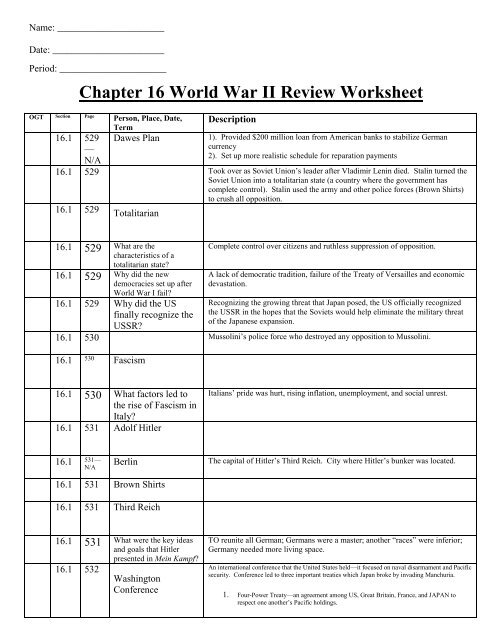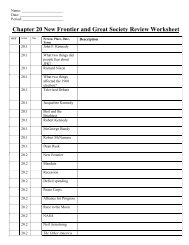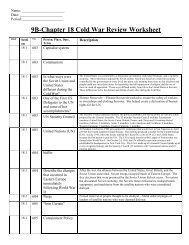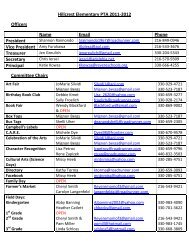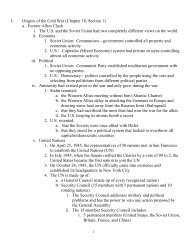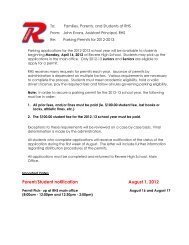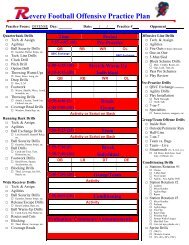Chapter 16 World War II Review Worksheet - Revere Local Schools
Chapter 16 World War II Review Worksheet - Revere Local Schools
Chapter 16 World War II Review Worksheet - Revere Local Schools
Create successful ePaper yourself
Turn your PDF publications into a flip-book with our unique Google optimized e-Paper software.
Name: ______________________<br />
Date: _______________________<br />
Period: ______________________<br />
<strong>Chapter</strong> <strong>16</strong> <strong>World</strong> <strong>War</strong> <strong>II</strong> <strong>Review</strong> <strong>Worksheet</strong><br />
OGT Section Page<br />
Person, Place, Date,<br />
Term<br />
<strong>16</strong>.1 529<br />
—<br />
N/A<br />
Dawes Plan<br />
Description<br />
1). Provided $200 million loan from American banks to stabilize German<br />
currency<br />
2). Set up more realistic schedule for reparation payments<br />
<strong>16</strong>.1 529 Took over as Soviet Union’s leader after Vladimir Lenin died. Stalin turned the<br />
Soviet Union into a totalitarian state (a country where the government has<br />
complete control). Stalin used the army and other police forces (Brown Shirts)<br />
to crush all opposition.<br />
<strong>16</strong>.1 529 Totalitarian<br />
<strong>16</strong>.1 529 What are the<br />
characteristics of a<br />
totalitarian state?<br />
<strong>16</strong>.1 529 Why did the new<br />
democracies set up after<br />
<strong>World</strong> <strong>War</strong> I fail?<br />
<strong>16</strong>.1 529 Why did the US<br />
finally recognize the<br />
USSR?<br />
Complete control over citizens and ruthless suppression of opposition.<br />
A lack of democratic tradition, failure of the Treaty of Versailles and economic<br />
devastation.<br />
Recognizing the growing threat that Japan posed, the US officially recognized<br />
the USSR in the hopes that the Soviets would help eliminate the military threat<br />
of the Japanese expansion.<br />
<strong>16</strong>.1 530 Mussolini’s police force who destroyed any opposition to Mussolini.<br />
<strong>16</strong>.1<br />
530<br />
Fascism<br />
<strong>16</strong>.1 530 What factors led to<br />
the rise of Fascism in<br />
Italy?<br />
<strong>16</strong>.1 531 Adolf Hitler<br />
Italians’ pride was hurt, rising inflation, unemployment, and social unrest.<br />
<strong>16</strong>.1<br />
531—<br />
N/A<br />
Berlin<br />
The capital of Hitler’s Third Reich. City where Hitler’s bunker was located.<br />
<strong>16</strong>.1 531 Brown Shirts<br />
<strong>16</strong>.1 531 Third Reich<br />
<strong>16</strong>.1 531 What were the key ideas<br />
and goals that Hitler<br />
presented in Mein Kampf?<br />
<strong>16</strong>.1 532<br />
Washington<br />
Conference<br />
TO reunite all German; Germans were a master; another “races” were inferior;<br />
Germany needed more living space.<br />
An international conference that the United States held—it focused on naval disarmament and Pacific<br />
security. Conference led to three important treaties which Japan broke by invading Manchuria.<br />
1. Four-Power Treaty—an agreement among US, Great Britain, France, and JAPAN to<br />
respect one another’s Pacific holdings.
<strong>16</strong>.1 532 Why did Japan<br />
invade Manchuria?<br />
<strong>16</strong>.1 532 Why did Japan invade<br />
Manchuria?<br />
<strong>16</strong>.1 533 Francisco Franco<br />
Japanese troops invade and occupied Manchuria in northeastern China. They did<br />
this because Manchuria was mineral-rich and contained an abundance of<br />
factories. They were seeking new land, resources, and factories because Japans<br />
population had exceeded its land.<br />
To gain “living space” and resources for people.<br />
<strong>16</strong>.1 533 In 1935 Italy invaded<br />
<strong>16</strong>.1 533 What foreign countries<br />
were involved in the<br />
Spanish Civil <strong>War</strong>?<br />
<strong>16</strong>.1 534 “Good Neighbor”<br />
<strong>16</strong>.1 534<br />
—<br />
N/A<br />
Policy<br />
Analyze how the<br />
Depression affected<br />
the United States<br />
foreign policy.<br />
<strong>16</strong>.1 534 Kellogg-Brand Pact<br />
Germany and Italy on the side of Franco; the Soviet Union in support of the<br />
Spanish government.<br />
FDR’s policy of not being intrusive to neighbors and just being a “good<br />
neighbor.” Good Neighbor specifically applied to Latin America.<br />
For most of President Roosevelt’s first two terms, he focused on domestic<br />
affairs. The crisis of the Depression brought foreign affairs into the background.<br />
Roosevelt realized that Americans were too involved with the situation at home<br />
to be interested in foreign affairs. For this reason even though Roosevelt<br />
believed that German expansion posed a threat to the United States, he was<br />
cautious in his efforts to alert the nation to this danger.<br />
<strong>16</strong>.1 534 Allowed the state Department to make treaties with other countries to mutually<br />
lower import duties. Within six years, the United States had reached such<br />
<strong>16</strong>.1 534 What factors contributed<br />
to Americans’ growing<br />
isolationism?<br />
<strong>16</strong>.1 534 What forced Franklin<br />
D. Roosevelt to wait<br />
until the bombing of<br />
Pearl Harbor before<br />
entering the war?<br />
<strong>16</strong>.1 535 Neutrality Acts<br />
agreements with more than a dozen nations.<br />
Evidence that large profits had been made by banks and arms industries during<br />
<strong>World</strong> <strong>War</strong> I; regret over having been involved in that war; hatred of militarism.<br />
The general mood of isolationism among Americans forced Roosevelt to follow<br />
a foreign policy based on neutrality. Isolationist forces in Congress were very<br />
strong. Roosevelt could not have entered the war without a declaration of war by<br />
Congress. There was no direct threat to the United States until Japan attacked<br />
Pearl Harbor; before that time, all the fighting took place in Europe, Africa, and<br />
Asia, far from the United States.<br />
<strong>16</strong>.2 541 Battle of Britain<br />
<strong>16</strong>.2 541—<br />
N/A<br />
Blackouts<br />
<strong>16</strong>.2 537 Munich Conference<br />
Cities would turnout their lights because they did not want the lights of the cities<br />
to create a target<br />
<strong>16</strong>.2 537 Neville Chamberlain<br />
<strong>16</strong>.2 537 What moves did Germany<br />
make in its quest for<br />
lebensraum?<br />
<strong>16</strong>.2 538 What was appeasement,<br />
and why did Churchill<br />
oppose it so strongly?<br />
Annexation of Austria and the Sudetenland.<br />
An attempt to do whatever was necessary to pacify Hitler; Churchill saw it as an<br />
abandonment of moral principles that would lead to a war and national disaster.<br />
2
<strong>16</strong>.2 539 9/1/1939<br />
<strong>16</strong>.2 539 Blitzkrieg<br />
<strong>16</strong>.2 539 Czechoslovakia Hitler took part of Czechoslovakia (Sudetenland—a German speaking region)<br />
and then broke the Munich Conference pact by taking the rest of Czechoslovakia<br />
<strong>16</strong>.2 539 Germany started war<br />
by attacking ____ on<br />
__/__/__<br />
<strong>16</strong>.2 539 How did German<br />
blitzkrieg tactics rely on<br />
new military technology?<br />
<strong>16</strong>.2 539 Luftwaffe<br />
The development of tanks and airplanes had made blitzkrieg tactics effective.<br />
<strong>16</strong>.2 539 Nonaggression Pact<br />
<strong>16</strong>.2 539—<br />
N/A<br />
Wehrmacht<br />
<strong>16</strong>.2 540 Charles de Gaulle<br />
Means German armed forces<br />
<strong>16</strong>.2 540 Dunkirk Once Belgium fell, the British forces were trapped. The only means of escape<br />
back to England was the port of Dunkirk on the French coast. The British called<br />
upon its civil population to donate any small ships that were available to move<br />
men and equipment from the European mainland. From May 26 to June 4, 1940,<br />
Operation Dynamo was put into action; 887 ships of all sizes (mostly private),<br />
sometimes dangerously, crossed the English Channel to rescue 338,226 men by<br />
bringing them to England. Allied forces were battered, but they were in tact<br />
enough to fight another day.<br />
<strong>16</strong>.2 540 How did Hitler rationalize<br />
the German invasion of<br />
Denmark and Norway?<br />
<strong>16</strong>.2 541 Benito Mussolini<br />
As a way of protecting their independence.<br />
<strong>16</strong>.2 554 Giving in to demands in an attempt to avoid a larger conflict; the allies appeased<br />
Germany by allowing them to take part of Czechoslovakia and in return agreed<br />
not to advance on any other territories (Munich Conference).<br />
<strong>16</strong>.3 542<br />
Holocaust<br />
<strong>16</strong>.3 543 Kristallnacht Night of Broken Glass—November 9, 1938—First act of German violence<br />
towards Jews. All over Germany, Austria and other Nazi controlled areas,<br />
Jewish shops and department stores had their windows smashed and contents<br />
destroyed.<br />
<strong>16</strong>.3 543 What problems did<br />
German Jews face in Nazi<br />
Germany from 1935 to<br />
1938?<br />
<strong>16</strong>.3 544 Genocide<br />
Loss of employment and property; harassment, humiliation, and physical harm;<br />
death threats and murder.<br />
3
<strong>16</strong>.3 544 How did the United states<br />
respond to Jewish<br />
refugees?<br />
The United States refused to loosen immigration restrictions to allow more Jews<br />
to immigrate to the United States.<br />
<strong>16</strong>.3 544 German ocean liner carrying 943 Jews in 1939 that was trying to escape<br />
Germany. The ship went to Miami and although 740 of the liner’s 943<br />
passengers had U.S. immigration papers, the ship was forced to return to Europe.<br />
Several countries in Europe also dined port and the ship returned to Germany.<br />
More than ½ of the passengers were later killed in the Holocaust.<br />
<strong>16</strong>.3 545 Ghettos<br />
<strong>16</strong>.3 545<br />
<strong>War</strong>saw Ghetto<br />
Rebellion<br />
<strong>16</strong>.3 546 Concentration camps<br />
In January 1943, <strong>War</strong>saw ghetto fighters fired upon German troops as they tried<br />
to round up another group of ghetto inhabitants for deportation. Fighters used a<br />
small supply of weapons that had been smuggled into the ghetto. After a few<br />
days, the troops retreated. This small victory inspired the ghetto fighters to<br />
prepare for future resistance. On April 19, 1943, the <strong>War</strong>saw ghetto uprising<br />
began after German troops and police entered the ghetto to deport its surviving<br />
inhabitants. Seven hundred and fifty fighters fought the heavily armed and welltrained<br />
Germans. The ghetto fighters were able to hold out for nearly a month,<br />
but on May <strong>16</strong>, 1943, the revolt ended.<br />
<strong>16</strong>.3 547<br />
—<br />
N/A<br />
Auschwitz<br />
<strong>16</strong>.3 547 Explain the Nazis’ “final<br />
solution to the Jewish<br />
question” and how they<br />
justified this policy.<br />
<strong>16</strong>.3 547 What was the goal of the<br />
Nazis’ Final Solution, and<br />
how was that goal nearly<br />
achieved?<br />
<strong>16</strong>.3 549 Elie Wiesel<br />
A German concentration camp in Poland. The camp was a major element in the<br />
perpetration of the Holocaust. The camp was actually subdivided into three<br />
camps:<br />
Auschwitz I, the original concentration camp which served as the<br />
administrative centre for the whole complex, and was the site of the<br />
deaths of roughly 70,000 Poles, gay men and Soviet Prisoners of <strong>War</strong><br />
Auschwitz <strong>II</strong> (Birkenau), an extermination camp and the site of the<br />
deaths of roughly 1 million Jews, 75,000 Poles, gay men and some<br />
19,000 Roma<br />
Auschwitz <strong>II</strong>I (Monowitz), which served as a labor camp for the IG<br />
Farben company<br />
The Nazis’ “final solution” was to exterminate the Jews. They justified this<br />
policy by arguing that so-called Aryans were superior to Jews and that inferior<br />
groups threatened the strength and purity of the “master race.” Nazis also<br />
justified their anti-Semitism by arguing that Jews and other minority groups were<br />
the cause of German’s problems after <strong>World</strong> <strong>War</strong> I.<br />
Extermination of European Jews in death camps.<br />
<strong>16</strong>.4 <strong>16</strong>.4 Atlantic Charter<br />
<strong>16</strong>.4 540 Evaluate the steps<br />
that President<br />
Roosevelt took to<br />
increase support to<br />
the Allies before<br />
In September 1940 President Roosevelt issued an executive order in which he<br />
transferred 50 older, <strong>World</strong> <strong>War</strong> I era destroyers to Britain in return for the use of<br />
certain military bases. In March 1941, Congress passed lend-lease, which made<br />
United States resources available to any nation whose deemed vital to the<br />
security of the United States. To protect United States merchant ships from<br />
German submarine attack, Congress revised the Neutrality Acts to allow that<br />
4
December 1941.<br />
<strong>16</strong>.4 550 “cash and carry”<br />
merchant ships be armed.<br />
<strong>16</strong>.4<br />
551—<br />
N/A<br />
Allied Advantages<br />
Tremendous manpower, great production capacity, enemy had to maintain troops<br />
on two active fronts<br />
<strong>16</strong>.4<br />
551—<br />
N/A<br />
Allied Powers<br />
<strong>16</strong>.4<br />
551—<br />
N/A<br />
<strong>16</strong>.4<br />
551—<br />
N/A<br />
<strong>16</strong>.4<br />
551—<br />
N/A<br />
Axis Advantages<br />
Axis Powers<br />
Explain the advantages<br />
the Axis Powers had over<br />
the Allies when the<br />
United States entered the<br />
war.<br />
<strong>16</strong>.4 551 Selective Service Act<br />
Better prepared for war and firm control of invaded areas<br />
Axis Powers had two distinct advantages. First, Germany and Japan had already<br />
secured firm control of the areas they had invaded. As a result, the United States<br />
and the Allies faced a long, drawn-out fight on several fronts. Second, Germany<br />
and Japan were better prepared for war. In the 1930s both nations had rearmed<br />
and built airfields, barracks, and training center.<br />
<strong>16</strong>.4 551<br />
—<br />
N/A<br />
Wendell Willkie<br />
In 1940 he was the Republican nominee for the 1940 presidential election.<br />
Willkie’s biggest campaign idea was urging people not to vote for FDR because<br />
it would lead to the US entering the war. Willkie, however, lost the election to<br />
Franklin D. Roosevelt.<br />
<strong>16</strong>.4 551 What impact did the<br />
outbreak of war in Europe<br />
have on U.S. foreign and<br />
defense policy?<br />
<strong>16</strong>.4 552 lend-lease<br />
Revision of the Neutrality Acts; dramatically increased defense spending;<br />
institution of the nation’s first peacetime draft.<br />
<strong>16</strong>.4 553 Why did Roosevelt take<br />
one “unneutral” step after<br />
another to assist Britain<br />
and the Soviet Union in<br />
1941?<br />
<strong>16</strong>.4 554 Embargo<br />
—<br />
Roosevelt believed that the best way to stop the Axis of powers was to help their<br />
opponents—mainly Britain and the Soviet Union.<br />
N/A<br />
<strong>16</strong>.4 554 Hideki Tojo a General in the Imperial Japanese Army, political right-wing thinker and the<br />
40th Prime Minister of Japan during much of <strong>World</strong> <strong>War</strong> <strong>II</strong>. During <strong>World</strong> <strong>War</strong><br />
<strong>II</strong> he led Japanese forces in the Pacific <strong>War</strong>, but after a series of military<br />
disasters, he was forced to resign on July 18, 1944, when some of his backers<br />
abandoned him in the aftermath of the fall of Saipan. He left government and<br />
<strong>16</strong>.4 554 What expectations<br />
about the postwar<br />
world were expressed<br />
in the Atlantic<br />
Charter?<br />
went into seclusion.<br />
The Atlantic Charter contained pledges of collective security, disarmament, self<br />
determination, economic cooperation, and freedom of seas. These points indicated the<br />
following assumptions and expectations: The Allies would win the war. Nazism,<br />
fascism, and totalitarianism would be defeated. Territory would change hands only as a<br />
result of the inhabitants’ wishes. Governments would reflect their citizens’ wishes.<br />
Nations would conduct freed trade and would cooperate in other matters. Aggressor<br />
nations would be disarmed. A system would be established to ensure and defend a secure<br />
5
<strong>16</strong>.4<br />
Why did the United States enter<br />
554<br />
into an undeclared shooting war<br />
with Germany in fall 1941?<br />
<strong>16</strong>.4 554 Why was the Atlantic<br />
<strong>16</strong>.4<br />
554—<br />
N/A<br />
Charter important?<br />
Winston Churchill<br />
peace based on freedom from want and fear.<br />
German U-boats were attacking American ships.<br />
It set forth the war aims of the Allies.<br />
<strong>16</strong>.4 555 How was oil a source of<br />
conflict between Japan<br />
and the United States?<br />
<strong>16</strong>.4 555 Pearl Harbor<br />
Japan needed oil, and the United States had placed an embargo on it to protest<br />
Japanese aggression in Indochina.<br />
<strong>16</strong>.4 555<br />
—<br />
N/A<br />
<strong>16</strong>.4 555<br />
—<br />
N/A<br />
<strong>16</strong>.4 555<br />
—<br />
N/A<br />
<strong>16</strong>.4 555<br />
—<br />
N/A<br />
What did the US fear<br />
from Japan if they did not<br />
fear a submarine or an<br />
aerial attack?<br />
What pieces of<br />
evidence (all the way<br />
up to the attack)<br />
could have/should<br />
have warned the US<br />
about the attack on<br />
Pearl Harbor?<br />
What pushed Japan to<br />
attack the United<br />
States?<br />
Why did the US not<br />
anticipate an aerial<br />
attack from Japan?<br />
<strong>16</strong>.4 557 “A day that will live<br />
in infamy”<br />
<strong>16</strong>.4 557 12/7/1941<br />
<strong>16</strong>.4 557<br />
—<br />
N/A<br />
According to President<br />
Roosevelt, what were the<br />
Four Freedoms that<br />
Americans were fighting<br />
for in the war?<br />
The US feared sabotage and for that reason they put all of their planes together at<br />
the airports so it would be easier to guard them. This made them easy targets on<br />
December 7.<br />
1) The missing Japanese’s fleet, 2) The overflow of Japanese communications<br />
(this usually meant a country was up to something and they did it to delay the<br />
interpretations/translations of the real messages because the enemy had to sort<br />
through all the false messages), 3) The Radar station picking up the Japanese<br />
aircraft but were dismissed as US B-59 Bombers flying in from the mainland,<br />
and 4) The Japanese Embassy closing up and destroying all confidential<br />
documents including their decoding machine.<br />
The US had been pushing for Japan to ease off and allow for an “Open Door”<br />
Policy in the Pacific. When Japan occupied Manchuria, Roosevelt immediately<br />
froze all Japanese assets in the US as well as stopping all trade of scrap metal to<br />
China. When Japan joined the Axis Powers, Roosevelt passed an embargo on<br />
shipments of gas, machines, tools, scrap iron, and steel going to Japan. This put<br />
a strangle hold on the Japanese military as well as the Japanese industries.<br />
Because Pearl Harbor was too shallow for conventional torpedoes to be dropped.<br />
Conventional torpedoes would bottom out; however, Japanese modified the tail<br />
to allow them to be dropped into shallower water.<br />
The Four Freedoms were freedom of speech, freedom of worship, freedom from<br />
want, and freedom from fear.<br />
6


